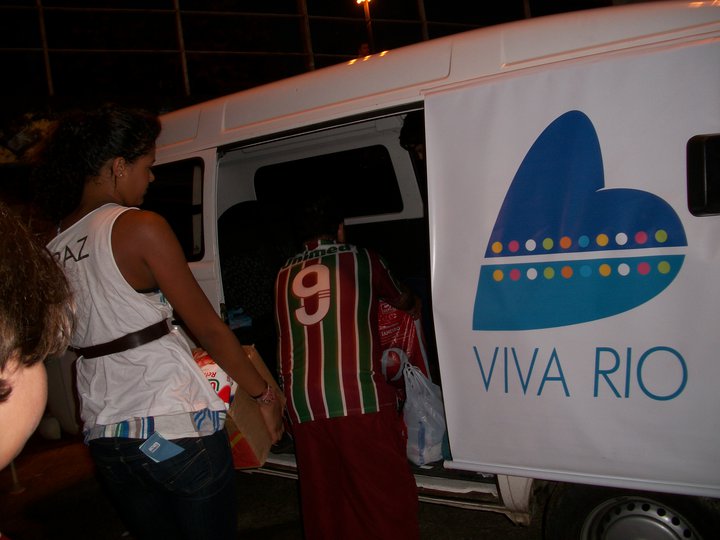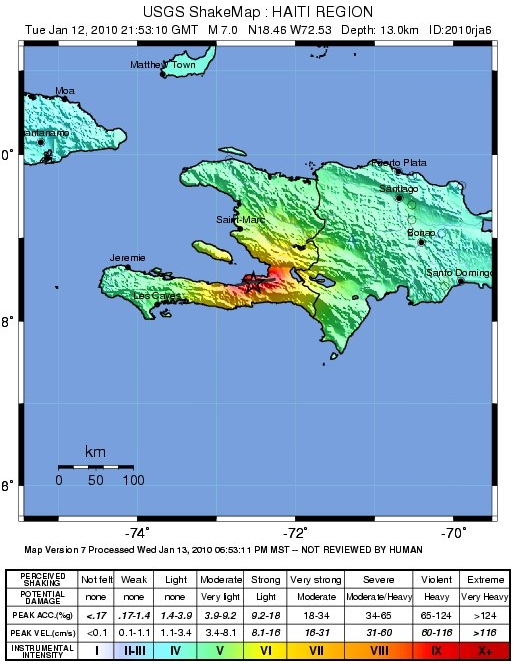|
Viva Rio
Viva Rio, a nongovernmental organization based in Rio de Janeiro, Brazil, was founded in December 1993 to combat the growing violence in the city. The organization has expanded into a multinational organization with a goal “to promote a culture of peace and social development through field work, research and formulation of public policies”.“About Viva Rio”. vivario.org.br. Viva Rio. 28 January 2008. 8 November 2010. Its mission statement is “to integrate a divided society and develop a culture of peace, integrating with civil society and public policies, working at grassroots and internationally through: designing and testing solutions to social problems, consultancies, advocacy, training, campaigns, communication”. The 2000 Prince Claus Awards, with the theme "Urban Heroes", gave one of three top Principal Awards to the Viva Rio organization. The Principal Award of €100,000 was presented during a ceremony at the Royal Palace in Amsterdam. History of Organization ... [...More Info...] [...Related Items...] OR: [Wikipedia] [Google] [Baidu] |
Non-profit Organization
A nonprofit organization (NPO) or non-profit organisation, also known as a non-business entity, not-for-profit organization, or nonprofit institution, is a legal entity organized and operated for a collective, public or social benefit, in contrast with an entity that operates as a business aiming to generate a profit for its owners. A nonprofit is subject to the non-distribution constraint: any revenues that exceed expenses must be committed to the organization's purpose, not taken by private parties. An array of organizations are nonprofit, including some political organizations, schools, business associations, churches, social clubs, and consumer cooperatives. Nonprofit entities may seek approval from governments to be tax-exempt, and some may also qualify to receive tax-deductible contributions, but an entity may incorporate as a nonprofit entity without securing tax-exempt status. Key aspects of nonprofits are accountability, trustworthiness, honesty, and openness to ev ... [...More Info...] [...Related Items...] OR: [Wikipedia] [Google] [Baidu] |
Gun Control
Gun control, or firearms regulation, is the set of laws or policies that regulate the manufacture, sale, transfer, possession, modification, or use of firearms by civilians. Most countries have a restrictive firearm guiding policy, with only a few legislations being categorized as permissive. Jurisdictions that regulate access to firearms typically restrict access to only certain categories of firearms and then to restrict the categories of persons who will be granted a license to have access to a firearm. In some countries, such as the United States, gun control may be legislated at either a federal level or a local state level. Terminology and context Gun control refers to domestic regulation of firearm manufacture, trade, possession, use, and transport, specifically with regard to the class of weapons referred to as small arms (revolvers and self-loading pistols, rifles, and carbines, assault rifles, submachine guns, and light machine guns). Usage of the term ''g ... [...More Info...] [...Related Items...] OR: [Wikipedia] [Google] [Baidu] |
Favelas
Favela () is an umbrella name for several types of working-class neighborhoods in Brazil. The term was first used in the Providência neighborhood in the center of Rio de Janeiro in the late 19th century, which was built by soldiers who had lived under the favela trees in Bahia and had nowhere to live following the Canudos War. Some of the first settlements were called ''bairros africanos'' (African neighborhoods). Over the years, many former enslaved Africans moved in. Even before the first favela came into being, poor citizens were pushed away from the city and forced to live in the far suburbs. Most modern favelas appeared in the 1970s due to rural exodus, when many people left rural areas of Brazil and moved to cities. Unable to find places to live, many people found themselves in favelas. Census data released in December 2011 by the Brazilian Institute of Geography and Statistics (IBGE) showed that in 2010, about 6 percent of the Brazilian population lived in favela ... [...More Info...] [...Related Items...] OR: [Wikipedia] [Google] [Baidu] |
Vivario Van
Vivario (; co, Vivariu) is a commune in the Haute-Corse department of France on the island of Corsica at the start of the climb to the Col de Vizzavona. Population Transport The town is served by a station on the Corsican Railways. See also * Communes of the Haute-Corse department The following is a list of the 236 Communes of France, communes of the Haute-Corse Departments of France, department of France. The communes cooperate in the following Communes of France#Intercommunality, intercommunalities (as of 2020): References Communes of Haute-Corse {{HauteCorse-geo-stub ...[...More Info...] [...Related Items...] OR: [Wikipedia] [Google] [Baidu] |
Disaster Relief
Emergency management or disaster management is the managerial function charged with creating the framework within which communities reduce vulnerability to hazards and cope with disasters. Emergency management, despite its name, does not actually focus on the management of emergencies, which can be understood as minor events with limited impacts and are managed through the day to day functions of a community. Instead, emergency management focuses on the management of disasters, which are events that produce more impacts than a community can handle on its own. The management of disasters tends to require some combination of activity from individuals and households, organizations, local, and/or higher levels of government. Although many different terminologies exist globally, the activities of emergency management can be generally categorized into preparedness, response, mitigation, and recovery, although other terms such as disaster risk reduction and prevention are also common. Th ... [...More Info...] [...Related Items...] OR: [Wikipedia] [Google] [Baidu] |
2010 Haiti Earthquake
A catastrophic magnitude 7.0 Mw earthquake struck Haiti at 16:53 local time (21:53 UTC) on Tuesday, 12 January 2010. The epicenter was near the town of Léogâne, Ouest department, approximately west of Port-au-Prince, Haiti's capital. By 24 January, at least 52 aftershocks measuring 4.5 or greater had been recorded. An estimated three million people were affected by the quake. Death toll estimates range from 100,000 to about 160,000 to Haitian government figures from 220,000 to 316,000, although these latter figures are a matter of some dispute. The government of Haiti estimated that 250,000 residences and 30,000 commercial buildings had collapsed or were severely damaged. The nation's history of national debt, prejudicial trade policies by other countries, and foreign intervention into national affairs contributed to the existing poverty and poor housing conditions that increased the death toll from the disaster. The earthquake caused major damage in Port-a ... [...More Info...] [...Related Items...] OR: [Wikipedia] [Google] [Baidu] |
Sanitation
Sanitation refers to public health conditions related to clean drinking water and treatment and disposal of human excreta and sewage. Preventing human contact with feces is part of sanitation, as is hand washing with soap. Sanitation systems aim to protect human health by providing a clean environment that will stop the transmission of disease, especially through the fecal–oral route.SuSanA (2008)Towards more sustainable sanitation solutions Sustainable Sanitation Alliance (SuSanA) For example, diarrhea, a main cause of malnutrition and stunted growth in children, can be reduced through adequate sanitation. There are many other diseases which are easily transmitted in communities that have low levels of sanitation, such as ascariasis (a type of intestinal worm infection or helminthiasis), cholera, hepatitis, polio, schistosomiasis, and trachoma, to name just a few. A range of sanitation technologies and approaches exists. Some examples are community-led total ... [...More Info...] [...Related Items...] OR: [Wikipedia] [Google] [Baidu] |
Potable Water
Drinking water is water that is used in drink or food preparation; potable water is water that is safe to be used as drinking water. The amount of drinking water required to maintain good health varies, and depends on physical activity level, age, health-related issues, and environmental conditions. This 2004 article focuses on the USA context and uses data collected from the US military. Recent work showed that the most important driver of water turnover which is closely linked to water requirements is energy expenditure. For those who work in a hot climate, up to a day may be required. Typically in developed countries, tap water meets drinking water quality standards, even though only a small proportion is actually consumed or used in food preparation. Other typical uses for tap water include washing, toilets, and irrigation. Greywater may also be used for toilets or irrigation. Its use for irrigation however may be associated with risks. Water may also be unacceptable due t ... [...More Info...] [...Related Items...] OR: [Wikipedia] [Google] [Baidu] |
Port-au-Prince
Port-au-Prince ( , ; ht, Pòtoprens ) is the capital and most populous city of Haiti. The city's population was estimated at 987,311 in 2015 with the metropolitan area estimated at a population of 2,618,894. The metropolitan area is defined by the IHSI as including the communes of Port-au-Prince, Delmas, Cite Soleil, Tabarre, Carrefour and Pétion-Ville. The city of Port-au-Prince is on the Gulf of Gonâve: the bay on which the city lies, which acts as a natural harbor, has sustained economic activity since the civilizations of the Taíno. It was first incorporated under French colonial rule in 1749. The city's layout is similar to that of an amphitheater; commercial districts are near the water, while residential neighborhoods are located on the hills above. Its population is difficult to ascertain due to the rapid growth of slums in the hillsides above the city; however, recent estimates place the metropolitan area's population at around 3.7 million, nearly half ... [...More Info...] [...Related Items...] OR: [Wikipedia] [Google] [Baidu] |
Peacekeeping
Peacekeeping comprises activities intended to create conditions that favour lasting peace. Research generally finds that peacekeeping reduces civilian and battlefield deaths, as well as reduces the risk of renewed warfare. Within the United Nations (UN) group of nation-state governments and organisations, there is a general understanding that at the international level, peacekeepers monitor and observe peace processes in post-conflict areas, and may assist ex-combatants in implementing peace agreement commitments that they have undertaken. Such assistance may come in many forms, including confidence-building measures, power-sharing arrangements, electoral support, strengthening the rule of law, and economic and social development. Accordingly, the UN peacekeepers (often referred to as Blue Berets or Blue Helmets because of their light blue berets or helmets) can include soldiers, police officers, and civilian personnel. The United Nations is not the only organisation to ... [...More Info...] [...Related Items...] OR: [Wikipedia] [Google] [Baidu] |
United Nations Security Council
The United Nations Security Council (UNSC) is one of the Organs of the United Nations, six principal organs of the United Nations (UN) and is charged with ensuring international security, international peace and security, recommending the admission of new UN members to the United Nations General Assembly, General Assembly, and approving any changes to the UN Charter. Its powers include establishing peacekeeping operations, enacting international sanctions, and authorizing military action. The UNSC is the only UN body with the authority to issue binding United Nations Security Council resolution, resolutions on member states. Like the UN as a whole, the Security Council was created after World War II to address the failings of the League of Nations in maintaining world peace. It held its first session on 17 January 1946 but was largely paralyzed in the following decades by the Cold War between the United States and the Soviet Union (and their allies). Nevertheless, it authorized ... [...More Info...] [...Related Items...] OR: [Wikipedia] [Google] [Baidu] |
Haiti
Haiti (; ht, Ayiti ; French: ), officially the Republic of Haiti (); ) and formerly known as Hayti, is a country located on the island of Hispaniola in the Greater Antilles archipelago of the Caribbean Sea, east of Cuba and Jamaica, and south of The Bahamas and the Turks and Caicos Islands. It occupies the western three-eighths of the island which it shares with the Dominican Republic. To its south-west lies the small Navassa Island, which is claimed by Haiti but is disputed as a United States territory under federal administration."Haiti" ''Encyclopædia Britannica''. Haiti is in size, the third largest country in the by area, and has an estimated population of 11.4 million, making it ... [...More Info...] [...Related Items...] OR: [Wikipedia] [Google] [Baidu] |

.jpg)




